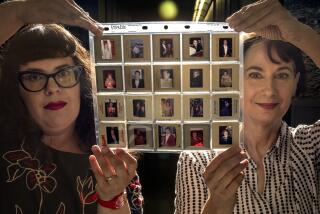A Man of Letters : Document Dealer Profits From Passion for Penmanship
- Share via
BEVERLY HILLS — The rich are different from you and me.
They can afford to collect handwritten fragments of history.
Consider, for example, Beverly Hills residents Barry and Louise Taper. The Tapers own one of the heart-stoppers in the major Abraham Lincoln show that opened this week at the Huntington Library in San Marino. It is a scrap of gauze bandage, dated March 28, 1864, and written in Lincoln’s own hand, that reads: “Let this boy be pardoned for any supposed desertion and discharged from the service.”
According to Kenneth W. Rendell, the Boston-based owner of a Beverly Hills gallery that specializes in historical documents, collecting materials penned by the famous isn’t about money. It’s about the emotional link with greatness a collector feels when looking at a love letter by F. Scott Fitzgerald or a query about troop strength signed by Napoleon.
“People don’t collect our material for investment,” said Rendell, at his Beverly Hills gallery recently to open an exhibit of literary autographs. “People buy this material with a passion. Most people die with their collections. It’s not something people are into and out of.”
Southern California may be a mecca for personal trainers and auto detailers, but it is also full of document collectors, many of them extremely sophisticated, said Rendell, 50.
The businessman, who also has galleries in Boston, New York and Tokyo, as well as a thriving catalogue business, won’t say how much his worldwide operation makes. But a 1990 magazine story about him reported that the business grossed between $10 million and $12 million annually. Opened just a year ago, the Westside gallery already does as much business as New York, Rendell said.
Most people assume that Rendell’s local collectors are obsessed with Hollywood and movie memorabilia. In fact, Rendell said, the Southland is the home of most of his serious collectors of literary documents. “You have a large number of very well-read, very intelligent people in Los Angeles,” he said. Actor Bronson Pinchot, for instance, can do more than comic simulations of Balkan accents. He is fluent in French and a major collector of materials related to Victor Hugo. A high-powered Hollywood agent also buys French literary material.
The typical collector of historical material is an entrepreneur of some kind, Rendell said, “an attorney, a physician, someone who makes decisions.” Not surprisingly, people who call the shots in business have an insatiable appetite for documents relating to famous movers and shakers. Documents signed by Napoleon, Winston Churchill and Thomas Edison are always in demand, Rendell said. Not every document relating to one of these modern giants is equally interesting, however. Churchill, for one, wrote letters with little or no emotional content. He seemed to save his passion for his speeches and other public writings. Among the major collectors of Churchill material: Ross Perot.
*
What people choose to collect is often terribly personal. Queen Elizabeth II collects material relating to queens who have gone before her. Massachusetts Sen. Edward M. Kennedy collects documents relating to others who have held his Senate seat. Singer/songwriter Don Henley, who has been active in the campaign to save Walden Pond, is a collector of Henry David Thoreau. Rendell himself has been a collector of letters since he was a teen-ager, when he sold his coin collection to underwrite his new enthusiasm.
Today he has a superb cache of documents and artifacts pertaining to World War II. His collection, which he hopes will someday become the basis for a museum and research center, includes everything from a draft of the Munich pact, with Neville Chamberlain’s notes and Hitler’s signature, to Nazi board games. But Rendell’s most prized possession is a letter in which Gen. Dwight D. Eisenhower agonizes over the loneliness of command and the burden of making decisions when every error is paid in the blood of someone else’s son. Again and again, Rendell is struck by Eisenhower’s thoughtfulness.
Presidents are almost always collectible, although who is hot changes from time to time. Truman and Eisenhower are both increasingly sought after, while there is little or no interest in Jimmy Carter or George Bush.
The collection of modern presidential autographs is complicated by the fact that few sign their own documents. “Starting with Kennedy, you can assume that any letter written by a President was signed by a machine,” Rendell said. There are exceptions, of course. One of the most popular modern presidents among collectors is Ronald Reagan. “He wrote great letters, and he handwrote letters,” Rendell said. Richard M. Nixon also sells well. “It’s absolutely true that Republicans sell for more than Democrats,” Rendell said. A good Nixon letter--one which reveals his character or touches on an interesting subject--is easier to sell than a comparable letter from John F. Kennedy. Both demand about $10,000.
The costliest document displayed in the Beverly Hills shop was a letter from George Washington expressing his fear that he would never be able to live up to the soaring expectations of the new nation that made him its first President. It is valued at $2.5 million.
Men still make up most of Rendell’s clientele, but more and more women are collecting. “Women are interested in women who have accomplished something,” he said, which may explain why “Eleanor Roosevelt, whom you couldn’t sell 10 years ago, is now very popular but Mamie Eisenhower is completely unchanged.” Documents signed by doomed French Queen Marie Antoinette are avidly sought. But even a woman’s success in a male-dominated field is no guarantee of popularity among collectors, nor is taking a masculine pseudonym . The French writer George Sand is tres chic, but the English novelist George Eliot is not. Go figure.
Sometimes a hit movie or some other event will spur a historical figure’s popularity. The Oscar-winning movie “Patton” (1970) triggered a run on Patton material, which was already rather scarce because the general was dyslexic and died at the relatively young age of 60. The current hit, “The Age of Innocence,” has earned the late Edith Wharton the top spot on many paperback bestseller lists and has also upped interest in her autograph material, which was already popular, Rendell said.
But no matter how urgent the demand, there is only so much historical material to go around--and less and less is being created as more and more important people pick up the phone instead of the pen. As Rendell put it, “I don’t care how many more people want Stonewall Jackson letters, there are none.”
Rendell, who did not finish college, has been educated by his profession. In 1982, he was paid $5,000 a day to scrutinize the so-called Hitler diaries, which he deemed to be a fraud. More recently, he exposed an alleged diary by Jack the Ripper as a hoax.
Rendell said people come to him every week with forged material they hope to sell. Occasionally, he said, he suspects he passes up a genuine signature because it isn’t cost-effective to authenticate it. He never buys Hitler autographs, for instance, unless there are nib marks on the paper. As Rendell explained, most Hitler signatures look hand-inked but were actually lithographed onto the documents that changed the world.
*
The Kenneth W. Rendell Gallery is at 309 N. Beverly Drive, Beverly Hills. The current exhibit, “Classics to Scripts: Four Centuries of Literary Letters, Manuscripts & Documents,” continues through Nov. 19. At 5 p.m. on Oct. 26 , Rendell will give a talk on historical documents and collecting, called “Other People’s Mail.” Information: (310) 550-1812.
Real or fake?
Note the unusual attention to detail and form in the forgery at the top, while the genuine example below is written in a much more carefree manner. The forger has also neglected Charles Dickens’ normal complimentary close.
--From “The Detection of Forged Historical Letters and Documents” by Kenneth W. Rendell
More to Read
The biggest entertainment stories
Get our big stories about Hollywood, film, television, music, arts, culture and more right in your inbox as soon as they publish.
You may occasionally receive promotional content from the Los Angeles Times.









